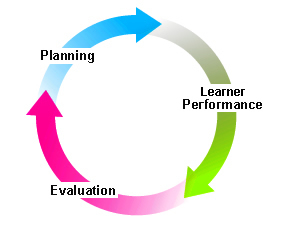Practical Science > Planning for effective practical work
Planning for effective practical work
In 'Reflecting on practical work', three key purposes for conducting practical work were identified.
- Developing knowledge and understanding of science.
- Learning practical skills.
- Developing an understanding of scientific enquiry.
In 'Reflecting on your practice', the key question was 'What makes practical work effective?'. Two levels of effectiveness were explored:
Level 1: Are learners doing what was intended?
Level 2: Are the learners learning (and can later recall, or demonstrate understanding of) the things they were meant to learn?
In this section, we look at planning practical activities so that they are effective at both Level 1 and Level 2.
Planning can be broken down into the following cyclical process.
- Planning
- Learner Performance
- Evaluation

The reflective tool considered in 'Reflecting on your practice' can be used to clarify the purpose of a practical activity and identify intended learning outcomes.
Evaluation happens after the practical activity has occurred, and can be used to improve the practical next time you offer it to learners.
This module focuses on the four steps hyperlinked above. Key prompts for this module are summarised in the planning tool.
There are five activities in this section, one for each of the four steps and one activity to bring all the steps together to plan a practical.
Select the section you would like to explore from the activities list on the right.

 Planning: The activity
Planning: The activity Planning tool
Planning tool